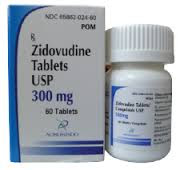
Zidovudine (ZDV), also known as azidothymidine (AZT), is an antiretroviral medication used to prevent and treat HIV/AIDS. More
Zidovudine (ZDV), also known as azidothymidine (AZT), is an antiretroviral medication used to prevent and treat HIV/AIDS.
Zidovudine-also known as azidothymidine (AZT), is an antiretroviral medication used to prevent and treat HIV/AIDS.
Azidothymidine; Retrovir; 3'-Azido-3'-deoxythymidine; AZT
Retrovir, Viro-Z, Zidine, Zidine 100, Zidine 300, Zido- H, Zidomax, Zidovir, Zilion, ZVD, ZVD Plus, Zydowin
1-[(2R,4S,5S)-4-azido-5-(hydroxymethyl)oxolan-2-yl]-5-methyl-1,2,3,4-tetrahydropyrimidine-2,4-dione
It is a structural analog of thymidine, a prodrug that must be phosphorylated to its active 5′-triphosphate metabolite, zidovudine triphosphate (ZDV-TP). It inhibits the activity of HIV-1 reverse transcriptase (RT) via DNA chain termination after incorporation of the nucleotide analogue. It is also a weak inhibitor of cellular DNA polymerase α and γ. It competes with the natural substrate dGTP and incorporates itself into viral DNA.
The recommended dose is 600 mg/day in divided doses as PO
Treatment of HIV (human immunovirus)/AIDS
Lactic acidosis, severe hepatomegaly with steatosis, hepatotoxicity. Nausea, severe headache, myalgia, insomnia, vomiting, anorexia, diarrhoea, asthenia, dizziness, taste perversion, convulsions, myopathy, nail, skin and oral mucosa pigmentation, raised LFT, pancreatitis, fat redistribution, neutropenia, leucopenia.
Reflecting the greater frequency of decreased hepatic, renal, or cardiac function, and of concomitant disease or other drug therapy Dose selection in elder patients should be cautious.
Store at 15-25°C (59-77°F).
267.2413
C10H13N5O4
30516-87-1